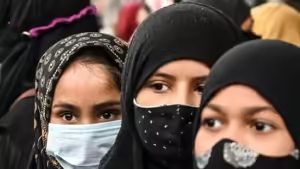The Supreme Court of India has granted an interim order of stay on the directions of NG Acharya and DK Marathe College Mumbai, Kolhapur, whereby the wearing of hijabs, niqabs, burqas, caps, and similar attire was prohibited on the College Campus. As much as the court has halted implementation of the college’s circular, it maintains the ban on wearing the burqa inside class and there is no religious practice permitted in the college.

The Supreme Court of India also placed huge consideration on the ability of the female students to freely choose what they want to wear stating that the code change was rather unexpected, especially by the college. ‘Girl students must have the freedom of choice in what they are wearing and the college cannot force them’, the bench said this with the realization of religious legal pluralism in India firmly in mind.
When, therefore, this happens in a college justice Kumar asked the college officials, “Can you say someone wearing a tilak will not be allowed? This is not part of your instructions?” as reported by Live Law.
The Supreme Court’s interference was based on a petition filed against a judgment of the Bombay High Court made in June this year that supported the ban by the college. Nine female students from the second and third years of a science degree course had challenged the directive stating that their rights to practice religion, privacy, personal dignity, culture, and choice of association had been violated.
Background of the Controversy
The problem started on May 1 this year when the Chembur Trombay Education Society’s NG Acharya & DK Marathe College, through an official WhatsApp group of faculty and students, informed a dress code. This code banned scarves, veils, gowns, head caps, pins, and gowns for hijabs, niqabs, burqas, caps, badges, and stoles on campus. The petitioners also contended that the notice that was given by the respondents lacked legal requirements and therefore, bad-in-law null and void.
Also Read: Sheikh Hasina Faces Uncertainty on London Asylum
Before approaching the media, the students wrote a letter to the college management and principals to withdraw the ban claiming their rights of self-choices, dignity, and privacy in the classroom. When these appeals were not being heard, then concerned appeals were made to the chancellor and vice-chancellor of Mumbai University as well as the University Grants Commission to help bring about the change and keep education non-sectarian. When no action was taken, the students decided to go to court; they petitioned the Bombay High Court.
From the transcripts of the high court proceedings, it was presented by the petitioners’ counsel Altaf Khan to demonstrate some Quranic verses that explained that hijab is a necessity of Islam. The plea described measures undertaken by the college as ‘arbitrary, unreasonable, bad in the law, and perverse. ‘
While defending the action, the college management stated that the dress code was meant to ensure that the students dressed uniformly and maintained order with no chances for the Muslim ladies to remove them, the policy did not have any merits of discriminating against the Muslim community. The college’s senior counsel Anil Anturkar claimed that this dress code applied to students regardless of their religion and caste.
The circular generated the desired knocks on the Supreme Court after which the court annulled the circular; however, the reprieve that accrues to the students awaits the final determination of the matter by the court.
Report By: Sonali Sarkar
Publish By: Your News Sources